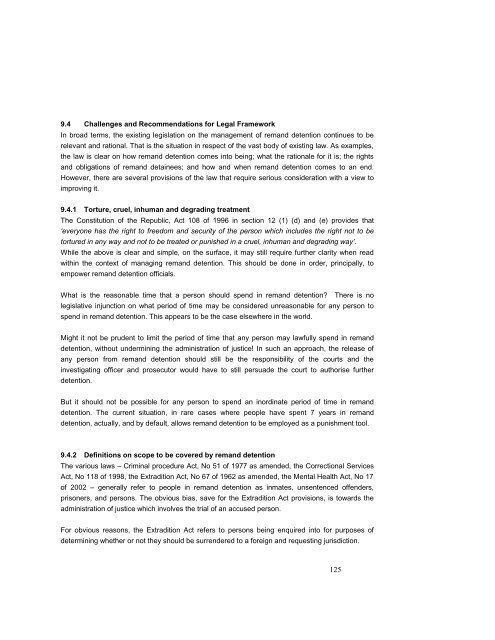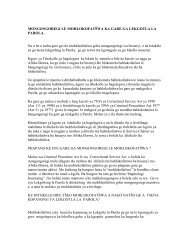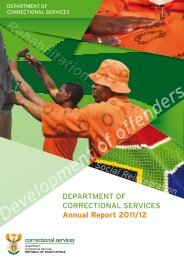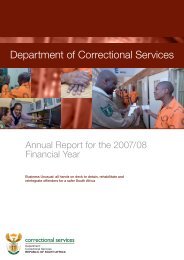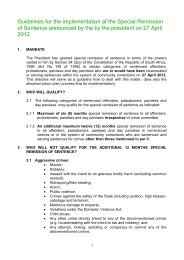Management of Remand Detainees in South Africa - DCS-Home
Management of Remand Detainees in South Africa - DCS-Home
Management of Remand Detainees in South Africa - DCS-Home
You also want an ePaper? Increase the reach of your titles
YUMPU automatically turns print PDFs into web optimized ePapers that Google loves.
9.4 Challenges and Recommendations for Legal Framework<br />
In broad terms, the exist<strong>in</strong>g legislation on the management <strong>of</strong> remand detention cont<strong>in</strong>ues to be<br />
relevant and rational. That is the situation <strong>in</strong> respect <strong>of</strong> the vast body <strong>of</strong> exist<strong>in</strong>g law. As examples,<br />
the law is clear on how remand detention comes <strong>in</strong>to be<strong>in</strong>g; what the rationale for it is; the rights<br />
and obligations <strong>of</strong> remand deta<strong>in</strong>ees; and how and when remand detention comes to an end.<br />
However, there are several provisions <strong>of</strong> the law that require serious consideration with a view to<br />
improv<strong>in</strong>g it.<br />
9.4.1 Torture, cruel, <strong>in</strong>human and degrad<strong>in</strong>g treatment<br />
The Constitution <strong>of</strong> the Republic, Act 108 <strong>of</strong> 1996 <strong>in</strong> section 12 (1) (d) and (e) provides that<br />
„everyone has the right to freedom and security <strong>of</strong> the person which <strong>in</strong>cludes the right not to be<br />
tortured <strong>in</strong> any way and not to be treated or punished <strong>in</strong> a cruel, <strong>in</strong>human and degrad<strong>in</strong>g way‟.<br />
While the above is clear and simple, on the surface, it may still require further clarity when read<br />
with<strong>in</strong> the context <strong>of</strong> manag<strong>in</strong>g remand detention. This should be done <strong>in</strong> order, pr<strong>in</strong>cipally, to<br />
empower remand detention <strong>of</strong>ficials.<br />
What is the reasonable time that a person should spend <strong>in</strong> remand detention? There is no<br />
legislative <strong>in</strong>junction on what period <strong>of</strong> time may be considered unreasonable for any person to<br />
spend <strong>in</strong> remand detention. This appears to be the case elsewhere <strong>in</strong> the world.<br />
Might it not be prudent to limit the period <strong>of</strong> time that any person may lawfully spend <strong>in</strong> remand<br />
detention, without underm<strong>in</strong><strong>in</strong>g the adm<strong>in</strong>istration <strong>of</strong> justice! In such an approach, the release <strong>of</strong><br />
any person from remand detention should still be the responsibility <strong>of</strong> the courts and the<br />
<strong>in</strong>vestigat<strong>in</strong>g <strong>of</strong>ficer and prosecutor would have to still persuade the court to authorise further<br />
detention.<br />
But it should not be possible for any person to spend an <strong>in</strong>ord<strong>in</strong>ate period <strong>of</strong> time <strong>in</strong> remand<br />
detention. The current situation, <strong>in</strong> rare cases where people have spent 7 years <strong>in</strong> remand<br />
detention, actually, and by default, allows remand detention to be employed as a punishment tool.<br />
9.4.2 Def<strong>in</strong>itions on scope to be covered by remand detention<br />
The various laws – Crim<strong>in</strong>al procedure Act, No 51 <strong>of</strong> 1977 as amended, the Correctional Services<br />
Act, No 118 <strong>of</strong> 1998, the Extradition Act, No 67 <strong>of</strong> 1962 as amended, the Mental Health Act, No 17<br />
<strong>of</strong> 2002 – generally refer to people <strong>in</strong> remand detention as <strong>in</strong>mates, unsentenced <strong>of</strong>fenders,<br />
prisoners, and persons. The obvious bias, save for the Extradition Act provisions, is towards the<br />
adm<strong>in</strong>istration <strong>of</strong> justice which <strong>in</strong>volves the trial <strong>of</strong> an accused person.<br />
For obvious reasons, the Extradition Act refers to persons be<strong>in</strong>g enquired <strong>in</strong>to for purposes <strong>of</strong><br />
determ<strong>in</strong><strong>in</strong>g whether or not they should be surrendered to a foreign and request<strong>in</strong>g jurisdiction.<br />
125


